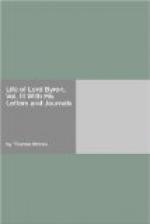him to marry without one; that she was, moreover, a
learned lady, which would not at all suit him.
In consequence of these representations, he agreed
that his friend should write a proposal for him
to the other lady named, which was accordingly done;—and
an answer, containing a refusal, arrived as they were,
one morning, sitting together. “You
see,” said Lord Byron, “that, after
all, Miss Milbanke is to be the person;—I
will write to her.” He accordingly
wrote on the moment, and, as soon as he had finished,
his friend, remonstrating still strongly against his
choice, took up the letter,—but, on
reading it over, observed, “Well, really,
this is a very pretty letter;—it is a pity
it should not go. I never read a prettier
one.”—“Then it shall
go,” said Lord Byron; and in so saying,
sealed and sent off, on the instant, this fiat
of his fate.
* * * * *
LETTER 200. TO MR. MOORE.
“Nd., September 15. 1814.
“I have written to you one letter to-night, but must send you this much more, as I have not franked my number, to say that I rejoice in my god-daughter, and will send her a coral and bells, which I hope she will accept, the moment I get back to London.
“My head is at this moment in a state of confusion, from various causes, which I can neither describe nor explain—but let that pass. My employments have been very rural—fishing, shooting, bathing, and boating. Books I have but few here, and those I have read ten times over, till sick of them. So, I have taken to breaking soda-water bottles with my pistols, and jumping into the water, and rowing over it, and firing at the fowls of the air. But why should I ‘monster my nothings’ to you, who are well employed, and happily too, I should hope? For my part, I am happy, too, in my way—but, as usual, have contrived to get into three or four perplexities, which I do not see my way through. But a few days, perhaps a day, will determine one of them.
“You do not say a word to me of your poem. I wish I could see or hear it. I neither could, nor would, do it or its author any harm. I believe I told you of Larry and Jacquy. A friend of mine was reading—at least a friend of his was reading—said Larry and Jacquy in a Brighton coach. A passenger took up the book and queried as to the author. The proprietor said ’there were two’—to which the answer of the unknown was, ’Ay, ay—a joint concern, I suppose, summot like Sternhold and Hopkins.’
“Is not this excellent?
I would not have missed the ’vile
comparison’ to
have ’scaped being one of the ’Arcades
ambo et
cantare pares.’
Good night. Again yours.”
* * * * *
LETTER 201. TO MR. MOORE.
“Newstead Abbey, Sept. 20. 1814.




